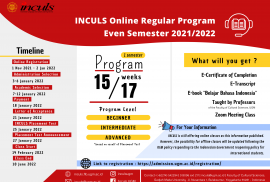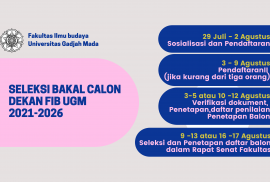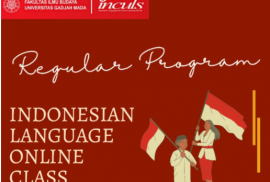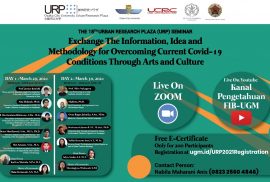Registration for the Regular Program Indonesian Language Online Class is now open! This program is a 15-17 weeks (1 semester) program. Students are grouped in the beginner, intermediate, and advanced classes based on the result of the placement tests. All subjects are taught by professors of the Faculty of Cultural Sciences, Universitas Gadjah Mada. At the end of the course, each student will receive an E-Certificate of completion and an E-Transcript signed by the Dean of the Faculty of Cultural Sciences, Universitas Gadjah Mada. Check out the timeline above!
Anyways, INCULS is still offering online classes as this information was published. However, the possibility for offline classes will be updated following the UGM policy responding to the Indonesian Government reopening policy for international students. For further information, please get in touch with our social media or email.
Hai Sobat Iconic,
ICONIC hadir kembali di tahun 2021!
Kami mengundang dan mengajak teman- teman semua di grup ini untuk ikut berpartisipasi dan berkontribusi dalam kegiatan ICONIC (Internasional Conference on Indonesian Culture) 2021. ICONIC merupakan konferensi lintas disiplin yang bertujuan menciptakan platform bagi peneliti interdisipliner untuk memperkaya kajian budaya Indonesia.
ICONIC tahun 2021 mengangkat tema Daya Lenting Ekosistem Kebudayaan di Masa Pandemi. Tema ini diangkat untuk merespon dari dampak pandemi covid-19 terhadap sektor Industri budaya dan kreatif. ICONIC membuka pendaftaran untuk karya penelitian budaya dengan pilhan 6 topik. Untuk Sobat Iconic yang tertarik, kami tunggu abstrak dari penelitian kalian tanggal 18 Oktober – 7 November 2021
Untuk persyaratan abstrak dan 6 topik ICONIC 2021 dapat dibuka di website: www.iconic.kebudayaan.online
Semoga informasi ini bermanfaat untuk teman-teman dan tetap semangat berkarya memajukan budaya Inonesia.
Untuk informasi tentang ICONIC 2021, follow :
IG dan FB : @iconiculture.id
IG : @bina_budaya
Salam Budaya!
iconic21SELEKSI BAKAL CALON DEKAN FIB UGM 2021-2026
1. 29 Juli – 2 Agustus: Sosialisasi dan Pendaftaran
2. 3 – 9 Agustus: PendaftaranII (jika kurang dari tiga orang)
3. 3-5 atau 10 -12 Agustus: Verifikasi dokument, Penetapan,daftar penilaian Penetapan Balon
4. 9 -13 atau 16 -17 Agustus: Seleksi dan Penetapan daftar balon dalam Rapat Senat Fakultas
Masih dalam situasi pandemi Covid-19, Indonesian Language and Culture Learning Service (INCULS), Fakultas Ilmu Budaya, Universitas Gadjah Mada, kembali membuka kursus Program Reguler dan Intensif daring bagi para peminat bahasa dan budaya Indonesia. Pendaftaran secara daring bisa dilakukan melalui laman https://admission.ugm.ac.id/registration/ mulai tanggal 15 Maret – 25 Juli 2021 untuk Program Reguler dan 2 Juni – 4 Desember 2021 untuk Program Intensif.
Keterangan lebih lanjut mengenai kedua Program tersebut bisa didapatkan di http://www.inculs.fib.ugm.ac.id/ dan melalui email ke inculs@ugm.ac.id .
inculs 1 inculs 2On 11 March 2020, the World Health Organization (WHO) declared a global pandemic: COVID-19. One of the main emergency measures taken by local Asian governments was the temporary suspension of all educational institutions, public services, and social, cultural, leisure-recreational activities, followed by the closing of non-essential businesses, including cultural institutions and industries. In contrast to this situation, the demand for cultural and creative content has gradually increased throughout the lockdown period, with digital access including the use of social media having become more critical than ever before. Ironically, despite the crucial role played by culture in times of isolation and resiliency, economic indicators predict that the cultural sector will be one of the most affected by, and probably one of the latest to recover from the pandemic and its consequences (UNESCO 2020).
The systemic uncertainty created by the crisis has indeed generated serious problem for the very human need to connect with arts and culture. It prevents us from visiting museum and heritage places to attending theatre performances and community cultural practices. UNESCO records that more than 95% were closed in May 2020, and 13% of them may not be reopen (UNESCO, 2020). The past few months has been witnessed that more than 75 million jobs in the travel and tourism sector are under threat. Cultural tourism makes up nearly 40% of world tourism revenue (UN NEWS). It is important to note that the cultural and cultural industries contribute to US $2,250 BN to the global economy and account for 29,5 million jobs worldwide. To overcome the crisis, some Asian countries have taken policies such as in China where the government funded
US $ 56 million for cultural and tourism business, and in Indonesia, the Directorate-General for Culture’s has launched a YouTube channel “BudayaSaya” to share artistic performances and artisans’ masterclasses on dancing, painting, music, storytelling, and producing films.
While the arts and cultural sectors are among the hardest hit by the global pandemic, it is believed that arts and culture play a pivotal position to controland minimize the impact of the pandemic. Karavaïeff (2020) reports how arts and culture might help people during the lockdown and confinement. Social distancing and isolation have created an ether of personal spaces, but it is in these spaces that we listen to that great music, watch movies, cultural performances, and obtain joy from the artworks that we see with our devices.
Museums have also gone through a process of digitalization of their collection and presented online to reach wider global audience during the pandemic. Against this background, the two day seminar addresses several issues on exchanging information, ideas, and methodology in the sector of arts and culture to overcome the current COVID-19 pandemic.





